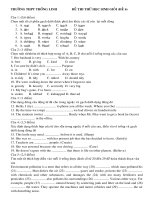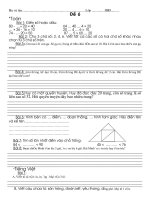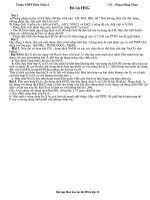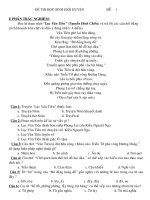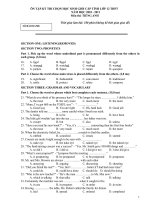đề ôn HSG 6
Bạn đang xem bản rút gọn của tài liệu. Xem và tải ngay bản đầy đủ của tài liệu tại đây (348.56 KB, 13 trang )
ĐỀ HỌC SINH GIỎI VÒNG TỈNH 2008-2009
SECTION 1: LISTENING
I. Listen to the dialogue between Joyce and a woman and then fill in the each blank with ONE
word. You will hear the recording two times.
W: So tell me about your (1) _______________, Joyce.
J: Well, it’s really small town.
W: What is it like there?
J: Oh, I think it’s very (2) _______________ place.
W: Really? Why?
J: Well, there is nothing to do. No good (3) _______________. No nightlife of any kind.
W: Uh, that’s too bad. But small towns are pretty (4) _______________ to live in.
J: Well, yeah, it is (5) _______________ cheap. And lots of people love it because it’s very (6)
_______________.
W: Yeah?
J: Uh-huh. It has great (7) _______________- lots of mountains and rivers, lakes, trees…
W: Well, I don’t know, Joyce. It (8) _______________ like a lovely place!
J: Well, yeah, if you like to go hiking in the summer and (9) _______________ in the winter. But,
you know, I’m not the (10) _______________ type! I’m a real city person.
II. Listen to the letter. Circle the words you hear. You will hear the recording two times.
a. delicious
b. happy
c. new
d. nice
e. cold
f. tall
g. warm
h. thin
i. long
j. straight
k. jealous
l. small
m. big
n. loud
o. dangerous
p. safe
q. fair
r. interesting
s. friendly
t. lucky
u. sharp
SECTION 2: GRAMMAR AND VOCABULARY:
I. Choose the best answer among A, B, C or D to complete each sentence: (10Ms)
1. The technological and economic changes of the 19
th
century had a marked …………….. on
workers
A. cause B. effect C. impact D. consequence
2. The government …………………….. the flood victims with food, clothes and money.
A. gave B. provided C. offered D. presented
3. More and more people …………………….. of food poisoning nowadays
A. exist B. survive C. die D. starve
4. The first sign of vitamin A disorder is night ……………………..
A. loss of sight B. lack of vision C. invisibility D. blindness
5. When you take ice out of the freezer, it ……………………..
A. melts B. dissolves C. softens D. disappears
6. There are many …………………….. of pollution in our modern world
A. resources B. sources C. bases D. foundation
7. Many people …………………….. that natural resources will never be use up
A. view B. regard C. consider D. believe
8. Using the computer competently is an important ……………….. to help one get a good job.
A. reason B. aspect C. factor D. issue
9. George wants £1000 for his car, but I don’t think it’s …………….. as much as that.
A. worth B. cost C. valued D. priced
10. “Did jenny say anything about her sister?”-No, she didn’t …………….. her at all.
A. remind B. remark C. refer D. mention
1
II. Choose the underlined part ( A, B, C, or D ) that is incorrect: (15Ms)
1. Families who are enough fortunate to own a historic home may be able to get restoration
A B C D
funds from the government.
2. The first things a new international student must do include renting an apartment,
A B
registering for classes, and to get to know the city.
C D
3. When parents allow his children to spend many hours watching television, the children
A B
are not likely to be physically fit.
C D
4. Christianity has become a worldwide religion since it has begun almost two thousand
A B C D
years ago.
5. As the population of Africa continues to grow, animals will continue to lose theirs natural
A B C D
habitat.
6. Actually, by the time Columbus arrived to America in 1492, other Europeans had already
A B C D
reached the New World.
7. The most Americans were killed in World War II than in any other war since the birth of
A B C D
the nation.
8. Antartica, which is largely covered by ice, receive hardly any rainfall.
A B C D
9. Jessica is only an amateur, but she sings sweeter than most professionals.
A B C D
10. Mrs. Adams was surprising that her son and his friend had gone to the mountains to ski.
A B C D
11. A cure for the common cold, causing by a virus, has not been found.
A B C D
12. Amelia Earhart, that was one of the pioneers in aviation, attempted to fly the world in
A B C
1937, but she and her plane mysteriously disappeared over the Pacific Ocean.
D
13. His last test results showed he was the quickest typist, yet he was the less accurate of all the
applicants.
A B C D
14. That secretary of mine is so efficient that she always amazes myself with her speed.
A B C D
15. A problem it has caused setbacks and we have been forced to change the final date of
A B C
completion if we want to avoid being penalized.
D
III. Supply the suitable form of the words in brackets: (10Ms)
2
Different (1) _________ (conserve) efforts have been made in order to (2) _________ (danger)
species. The Red List – (3) _________ (globe) list of endangered and vulnerable animal species –
has been introduced to raise people’s awareness of conservation needs. Governments have enacted
laws to protect wildlife from commercial trade and (4) _________(hunt). Another _________
(conserve) effort is the development of wildlife habitat (5) _________ (reserve) as they are
suitable for the (6) _________ (survive) of a wide range of species.
The current globe extinction crisis is one of the (7) __________ (great) challenges to mankind.
To preserve the earth’s (8) __________ (value) biodiversity for future generations, the protection
of __________ (danger) species and their habitats should be a top (9) _______ (prior) for
international organizations, (10) __________ (govern) agencies, industry and individuals.
IV. Put the verb in parentheses in correct tenses: (10Ms)
John has always traveled a lot. In fact, he was only two years old when he first flew to the
US. His mother is Italian and his father is American. John was born in France, but his parents 1
(meet)............................ in Cologne, Germany after they 2 (live)…………...... there for five
years. They had met one day while John’s father was reading a book in the library and his mother
3 (sit)……………...... beside him. John 4 (travel)............................ a lot because his parents also
travel a lot. As a matter of fact, John is visiting his parents in France at the moment. He lives in
New York now, but 5 (visit)…….………....... his parents for the last few weeks. He really enjoys
living in New York, but he also loves coming to visit his parents at least once a year. This year he
6 (fly)......................... over 5,000 miles for his job. He has been working for Jackson & Co. for
almost two years now. He 7 (be)………..…..….... pretty sure that he 8 (work)..........................
for them next year as well. His job requires a lot of travel. In fact, by the end of this year, he 9
(travel)…..……….……..... over 120,000 miles! His next journey will be to Australia. He really
doesn’t like going to Australia because it is so far. This time he 10 (fly)............................. from
Paris after a meeting with the company’s French partner. He will have been sitting for over 18
hours by the time he arrives!
V. Choose the word (A, B, C or D) that best completes each sentence: (25Ms)
1. Do you know _________?
A. who how many people go on Sundays to church
B. who go to church on Sundays how many people
C. how many people who go on Sundays to church
D. how many people who go to church on Sundays
2. We watch the cat ________ the tree.
A. climbed B. climb C. had climbed D. was climbing
3. If we had known your new address, we ________ to see you.
A. came B. will come C. would come D. would have come
4. You may borrow as many books as you like, provided you show them to ________ is at the
desk.
A. whoever B. who C. whom D. which
5. He looked forward to ________ his first pay packet.
A. receive B. have received C. be receiving D. receiving
6. Carol refused; ________, her answer was “no”.
A. in other words B. otherwise C. words for wordsD. however
7. If you see Tom _________ you mind _________ him to get in touch with me?
A. will / reminding B. will / to remind C. would / reminding D. would / to remind
8. _________ I hear that song, I think of you.
A. Whatever B. Forever C. Whenever D. However
9. “Let’s go dancing, _________?” – “Yes, let’s.”
A. will we B. don’t we C. do we D. shall we
10. I wish I _________ all about this matter a week ago.
3
A. knew B. know C. had known D. B & C are correct.
11. He was _________ he could not wake up.
A. very tired that B. such tired that C. too tired that D. so tired that
12. Joan asked _________.
A. if there was coffee B. there was coffee C. was there coffee D. where was the coffee
13. She didn’t know _________ to have fish or chicken for lunch.
A. both B. whether C. neither D. as
14. For lunch, you may have _________ fish or chicken.
A. both B. neither C. not only D. either
15. I suppose there’s a lot _________ between now and the first show.
A. to be done B. done C. we do D. to have done
16. I ____ my house ____. That is why there is all this mess.
A. had – paint B. have – paint C. had had - paint D. am having – painted
17. I warned him _________.
A. to be not late B. don’t be late C. not to be late D. he is not late
18. I should have _________ my hair cut weeks ago, but just don’t seem to have had time.
A. let B. made C. had D. gotten
19. I could not cut the grass because the machine _________ a few days previously.
A. broke down B. has been broken C. had broken down D. breaks down
20. If you want to develop inner tranquility, you have to stop _________ by every little thing that
happens.
A. bothering B. being bothered C. to bother D. to be bothered
21. He was made _________ for two hours.
A. to wait B. wait C. waiting D. waited
22. My boss is angry with me. I didn’t do all the work that I _________ last week.
A. should do B. should have done
C. must have done D. might have done
23. Ann is not at home. She’s __________ to dinner.
A. been B. gone C. went D. being
24. “Where are my jeans?” “They _________ at the moment. Sorry.”
A. are washing B. were washed C. are washed D. are being washed
25. The film was __________. There was so much blood in it.
A. horrify B. horrified C. horrifying D. being horrified
SECTION 3: READING
I. Rearrange the following five paragraphs.
A. One should be wary, however, of assuming that silent reading came about simply
because reading aloud is a distraction to others. Examination that factors related to the historical
development of silent reading reveals that it became the usual mode of reading for most adult
reading tasks mainly because the tasks themselves changed in character.
B. By the end of the century students were being recommended to adopt attitudes to books
and to use skills in reading them which were inappropriate, if not impossible, for the oral reader.
The social, cultural, and technological changes in the century had greatly altered what the term
“reading” implied.
C. Reading to oneself is a modern activity which was almost unknown to the scholars of
the classical and medieval worlds, while during the fifteen century the term “reading” undoubtedly
meant reading aloud. Only during the nineteen century did silent reading become commonplace.
D. Towards the end of the century there was still considerable argument over whether
books should be used for information or treated respectfully, and over whether the reading of
material such as newspapers was in some way mentally weakening. Indeed this argument remains
4
with us still in education. However, whatever its virtues, the old shared literary culture had gone
and was replaced by the printed mass media on the one hand and by books and periodicals for a
specialized readership on the other.
E. The last century saw a steady gradual increase in literacy, and thus in the number of
readers. As readers increased, so the number of potential listeners declined, and thus there was
some reduction in the need to read aloud. As reading for the benefit of listeners grew less
common, so came the flourishing of reading as a private activity in such public places as libraries,
railway carriages and offices, where reading aloud would cause distraction to other readers.
Your answers:
1. ------------------ 2. ------------------ 3. ------------------
4. ------------------ 5. ------------------
II. Read the passage and choose the best answer to complete it.
An unlucky day
Helen packed a small suitcase, said goodbye to her mother and hurried out of the house to
(1) __________ to the station. There was no one (2) ____________ waiting at the bus stop, so it
looked as if a bus had just left. Helen looked at her watch anxiously; it was already two o’clock.
Her train left at two thirty, and since it would (3) __________ at least twenty minutes to reach the
station, she did not have much time to (4) __________, even if a bus came along at once.
Just then a taxi came slowly down the road. Helen knew that the (5) __________ to the
station was at least two dollars, which was more than she could (6) ___________, but she quickly
made her (7) ___________ that it would be well (8) ___________ the extra expense in order to be
sure of catching the train. So she stopped the taxi and got in. she told the driver that she had to
catch the train which left at half past two. The man nodded and said that he would take a short (9)
___________ to get her to the station in good time.
All went well until, just as they were coming out of a side street into the (10) _________
that lead to the station, the taxi ran (11) ___________ a car. There was a loud crash and Helen was
thrown (12) _________ so violently that she hit her head on the front seat. Both drivers got out
and began (13) _________ each other. Helen got out as (14) _____ to ask them to stop quarrelling,
but (15) _________ took any notice of her at all.
1. A. go on bus B. get the bus C. drive taxi D. catch the bus
2. A. else B. other C. person D. more
3. A. be B. take C. waste D. lose
4. A. spend B. wait for C. spare D. go
5. A. cost B. expense C. fare D. money
6. A. pay B. afford C. give D. have
7. A. decision B. mind C. head D. own
8. A. cheap B. done C. for D. worth
9. A. time B. way C. cut D. road
10. A. main road B. main side street C. alley D. train
11. A. off B. up C. for D. into
12. A. forward B. over C. up D. hard
13. A. shouting B. to shout at C. to shout for D. shouting to
14. A. well B. soon C. much D. if
15. A. none B. no one C. neither D. both of them
III. Read the two passages and choose the best answer to the questions or to complete the
statements .
PASSAGE 1:
A pilot cannot fly by sight alone. In many conditions, such as flying at night and landing in
dense fog, a pilot must use radar, an alternative way of navigating. Since human eyes are not very
good at determining speeds of approaching objects, radar can show a pilot how fast nearby planes
5
